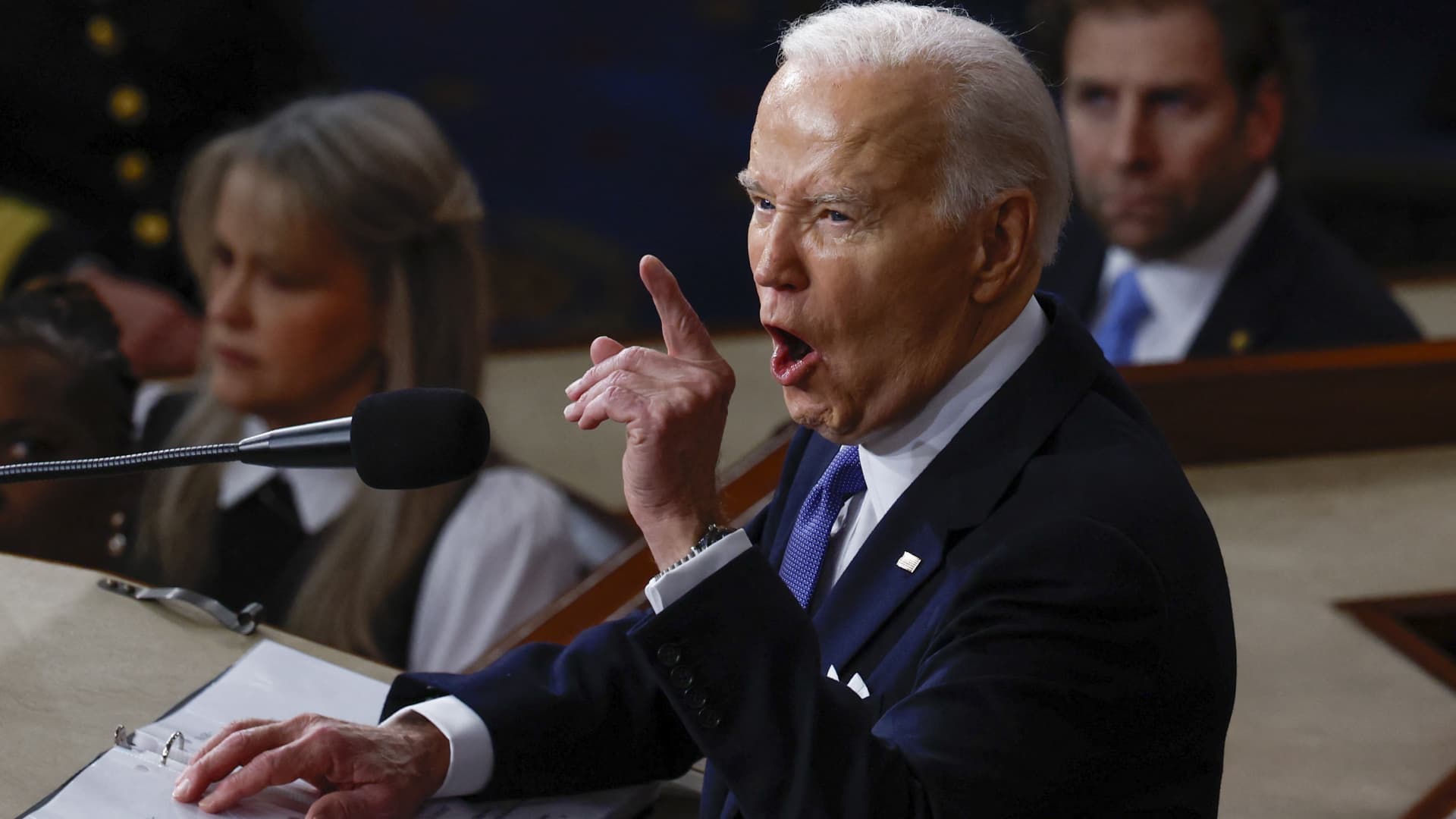Republican presidential candidate and former U.S. President Donald Trump gestures to supporters as he hosts a campaign rally at the Forum River Center in Rome, Georgia, U.S. March 9, 2024.
Alyssa Pointer | Reuters
President Joe Biden on Monday quickly slapped down Donald Trump’s suggestion in a CNBC interview that “there is a lot” that can be done in terms of cutting the government programs Social Security, Medicare and Medicaid.
“Not on my watch,” Biden said in a social media post on X in response to a video of Trump’s comment that was posted by his reelection campaign.
It was the latest quick response by Biden and his campaign to something said by the former president, who as the presumptive Republican nominee is on track to face Biden in November in a rematch of the 2020 election.
The White House also issued a statement calling the idea of cutting Social Security and Medicaid “exactly backwards.”
Trump was asked Monday by CNBC’s Joe Kernen on “Squawk Box” if he had changed his “outlook on how to handle entitlements: Social Security, Medicare and Medicaid.”
Trump replied, “So first of all, there is a lot you can do in terms of entitlements — in terms of cutting — and in terms of also the theft and the bad management of entitlements.”
“Tremendous bad management of entitlements. There is tremendous amounts of things, and numbers of things, you can do,” Trump said.
Trump took issue with Kernen’s suggestion that there is at least the perception that there was not much difference between how he views the idea of cutting entitlement spending and how Biden views it.
“I don’t necessarily agree with the statement,” Trump said.
“I know that they’re going to end up weakening Social Security because the country is weak,” he added, referring to the Biden administration.
White House spokesman Andrew Bates later issued a statement noting that Biden, in his State of the Union address to Congress last week, had warned that “Republican officials plan to cut Medicare and Social Security.”
U.S. President Joe Biden delivers the State of the Union address to a joint session of Congress in the House Chamber of the U.S. Capitol in Washington, U.S., March 7, 2024.
Evelyn Hockstein | Reuters
“On Thursday, this President was clear that, ‘If anyone here tries to cut Social Security or Medicare or raise the retirement age, I will stop you … I’ll protect and strengthen Social Security and make the wealthy pay their fair share,'” Bates said.
The spokesman added, “Cutting the Medicare and Social Security benefits that Americans have paid to earn their whole lives — only to make room for yet more unaffordable, trickle down tax giveaways to the super wealthy — is exactly backwards.”
Kernen, in the interview with Trump, said that entitlements such as Social Security and Medicare are “almost a third rail of politics,” meaning that elected officials avoid cutting them because of fears voters will punish them on Election Day if they do so.
The host told Trump that “it seems like something has to be done” to cut spending on such entitlements, or the level of federal government debt would remain high.
The government has a debt of $34.46 trillion, according to the U.S. Treasury Department.
In fiscal year 2023, the federal government spent $6.13 trillion.
Social Security is, by far, the biggest single budget line in federal spending, accounting for 22% of the government’s current spending.
Spending on health, which includes the Medicare and Medicaid programs, is tied with defense as the second-largest budget line item, accounting for 14% of federal spending.
More than 150 million people are covered by Medicare or Medicaid, according to the latest government figures, or about 45% of the U.S. population. Medicare covers primarily older Americans, while Medicaid covers primarily Americans with lower incomes.
The Social Security Administration says an average of almost 68 million people get benefits monthly, about 20% of the U.S. population.
The vast majority of those Social Security recipients are age 62 and older.
Older Americans are more likely to vote in elections than other age groups, according to the U.S. Census Bureau.
In the 2020 presidential election that saw Biden defeat Trump, “voter turnout was highest among those ages 65 to 74 at 76.0%” of registered voters in that age group, according to the bureau.
Trump, however, had a 6 percentage point edge over Biden among voters ages 50 to 64, and a 4 percentage point edge over the Democrat among voters 65 years and older.
Don’t miss these stories from CNBC PRO:

